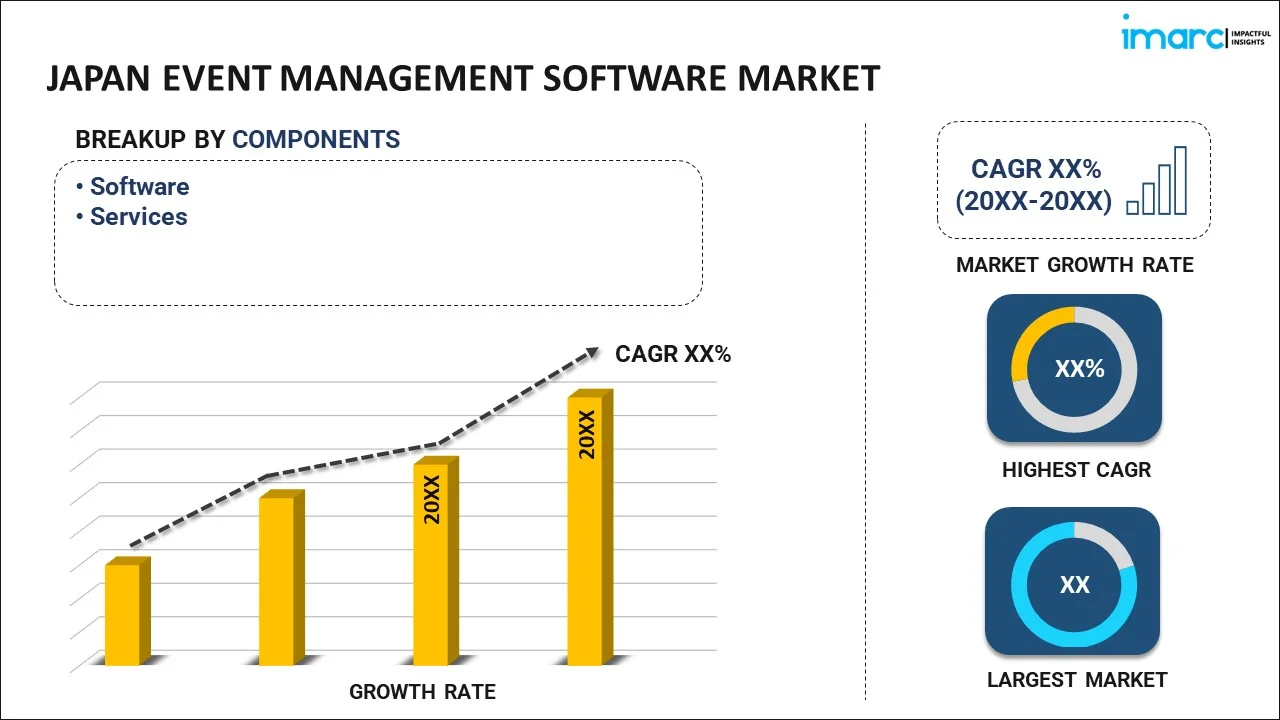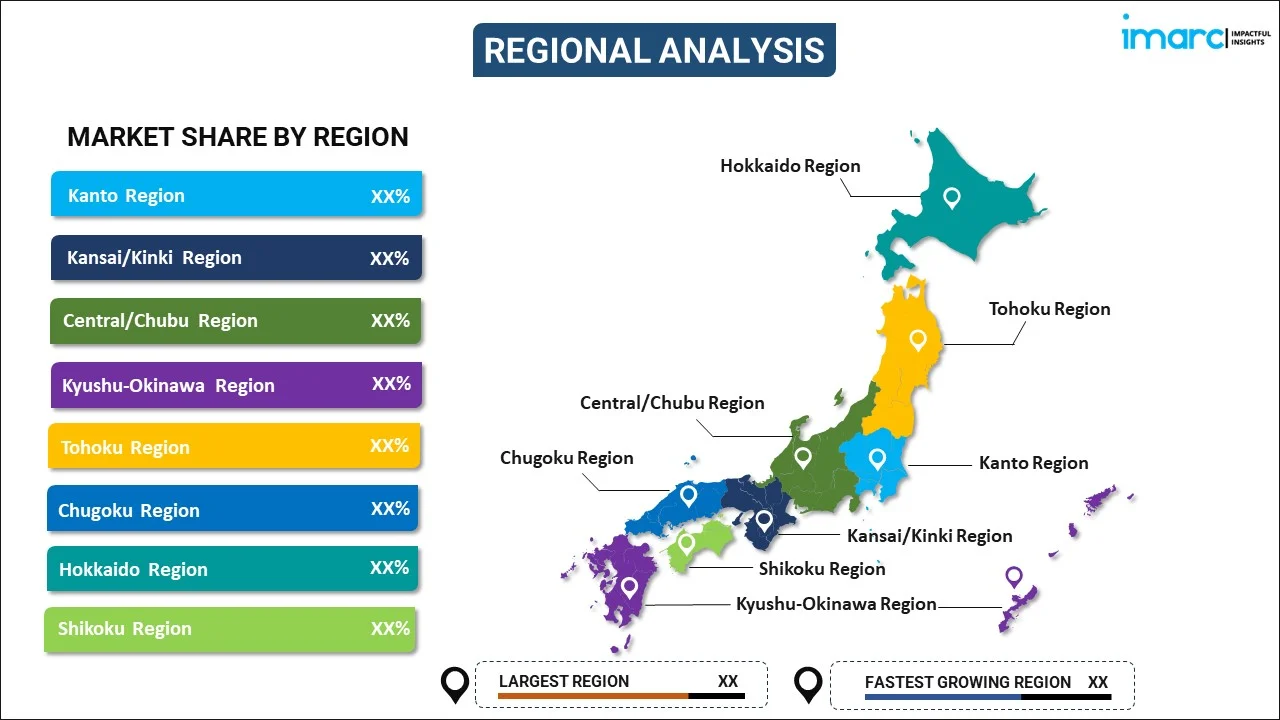
Japan Event Management Software Market Report by Component (Software, Services), Deployment Type (On-premises, Cloud), Organization Size (Large Enterprises, Small and Medium Enterprises), End User (Corporate, Government, Third-party Planner, Education, Mining, and Others), and Region 2026-2034
Market Overview:
Japan event management software market size reached USD 267.6 Million in 2025. Looking forward, IMARC Group expects the market to reach USD 581.7 Million by 2034, exhibiting a growth rate (CAGR) of 9.01% during 2026-2034. The inflating popularity of artificial intelligence-driven features, such as chatbots for attendee inquiries, automated marketing campaigns, and predictive analytics, which help organizers save time and resources, is driving the market.
|
Report Attribute
|
Key Statistics
|
|---|---|
|
Base Year
|
2025
|
|
Forecast Years
|
2026-2034
|
|
Historical Years
|
2020-2025
|
| Market Size in 2025 | USD 267.6 Million |
| Market Forecast in 2034 | USD 581.7 Million |
| Market Growth Rate 2026-2034 | 9.01% |
Event management software is a powerful tool that streamlines the planning and execution of events, making the entire process more efficient and organized. This software is designed to handle all aspects of event planning, from creating budgets and guest lists to scheduling and coordinating logistics. It allows event planners to centralize their tasks, communicate with team members, and track progress in real-time. One of the key benefits of event management software is its ability to automate repetitive tasks, such as sending invitations, managing RSVPs, and generating reports. This not only saves time but also reduces the risk of human error. Additionally, it enhances the guest experience by providing online registration, ticketing, and easy access to event information. Furthermore, event management software enables data analysis, helping organizers make data-driven decisions for future events. Whether it's a corporate conference, wedding, or music festival, this software is an indispensable tool for professionals in the event planning industry, ensuring flawless execution and memorable experiences for attendees.
Japan Event Management Software Market Trends:
The event management software market in Japan is experiencing substantial growth, primarily due to several key drivers that are propelling its expansion. Firstly, the increasing adoption of technology across various industries has been a pivotal catalyst. As businesses and organizations seek to streamline their event planning and execution processes, they are turning to software solutions for efficiency gains. Furthermore, the regional shift towards virtual and hybrid events has created a surge in demand for event management software. The need for platforms that can facilitate seamless online interactions, registration, and content management has become paramount. Consequently, the software market has adapted to meet this evolving landscape. Moreover, the emphasis on data-driven decision-making is another driving force. Event management software not only automates tasks but also provides valuable insights through analytics, helping organizers optimize their events and enhance attendee experiences. Additionally, the growing focus on sustainability, which has led to a demand for software that aids in minimizing the environmental footprint of events, is expected to drive the event management software market in Japan during the forecast period.
Japan Event Management Software Market Segmentation:
IMARC Group provides an analysis of the key trends in each segment of the market, along with forecasts at the country level for 2026-2034. Our report has categorized the market based on component, deployment type, organization size, and end user.
Component Insights:

- Software
- Venue Management Software
- Ticketing Software
- Event Registration Software
- Event Marketing Software
- Event Planning Software
- Others
- Services
- Professional Services
- Managed Services
The report has provided a detailed breakup and analysis of the market based on the component. This includes software (venue management software, ticketing software, event registration software, event marketing software, event planning software, and others) and services (professional services and managed services).
Deployment Type Insights:
- On-premises
- Cloud
A detailed breakup and analysis of the market based on the deployment type have also been provided in the report. This includes on-premises and cloud.
Organization Size Insights:
- Large Enterprises
- Small and Medium Enterprises
The report has provided a detailed breakup and analysis of the market based on the organization size. This includes large enterprises and small and medium enterprises.
End User Insights:
- Corporate
- Government
- Third-party Planner
- Education
- Mining
- Others
A detailed breakup and analysis of the market based on the end user have also been provided in the report. This includes corporate, government, third-party planner, education, mining, and others.
Regional Insights:

- Kanto Region
- Kansai/Kinki Region
- Central/ Chubu Region
- Kyushu-Okinawa Region
- Tohoku Region
- Chugoku Region
- Hokkaido Region
- Shikoku Region
The report has also provided a comprehensive analysis of all the major regional markets, which include Kanto Region, Kansai/Kinki Region, Central/ Chubu Region, Kyushu-Okinawa Region, Tohoku Region, Chugoku Region, Hokkaido Region, and Shikoku Region.
Competitive Landscape:
The market research report has also provided a comprehensive analysis of the competitive landscape. Competitive analysis such as market structure, key player positioning, top winning strategies, competitive dashboard, and company evaluation quadrant has been covered in the report. Also, detailed profiles of all major companies have been provided.
Japan Event Management Software Market Report Coverage:
| Report Features | Details |
|---|---|
| Base Year of the Analysis | 2025 |
| Historical Period | 2020-2025 |
| Forecast Period | 2026-2034 |
| Units | Million USD |
| Scope of the Report | Exploration of Historical and Forecast Trends, Industry Catalysts and Challenges, Segment-Wise Historical and Predictive Market Assessment:
|
| Components Covered |
|
| Deployment Types Covered | On-premises, Cloud |
| Organization Sizes Covered | Large Enterprises, Small and Medium Enterprises |
| End Users Covered | Corporate, Government, Third-party Planner, Education, Mining, Others |
| Regions Covered | Kanto Region, Kansai/Kinki Region, Central/ Chubu Region, Kyushu-Okinawa Region, Tohoku Region, Chugoku Region, Hokkaido Region, Shikoku Region |
| Customization Scope | 10% Free Customization |
| Post-Sale Analyst Support | 10-12 Weeks |
| Delivery Format | PDF and Excel through Email (We can also provide the editable version of the report in PPT/Word format on special request) |
Key Questions Answered in This Report:
- How has the Japan event management software market performed so far and how will it perform in the coming years?
- What has been the impact of COVID-19 on the Japan event management software market?
- What is the breakup of the Japan event management software market on the basis of component?
- What is the breakup of the Japan event management software market on the basis of deployment type?
- What is the breakup of the Japan event management software market on the basis of organization size?
- What is the breakup of the Japan event management software market on the basis of end user?
- What are the various stages in the value chain of the Japan event management software market?
- What are the key driving factors and challenges in the Japan event management software?
- What is the structure of the Japan event management software market and who are the key players?
- What is the degree of competition in the Japan event management software market?
Key Benefits for Stakeholders:
- IMARC’s industry report offers a comprehensive quantitative analysis of various market segments, historical and current market trends, market forecasts, and dynamics of the Japan event management software market from 2020-2034.
- The research report provides the latest information on the market drivers, challenges, and opportunities in the Japan event management software market.
- Porter's five forces analysis assist stakeholders in assessing the impact of new entrants, competitive rivalry, supplier power, buyer power, and the threat of substitution. It helps stakeholders to analyze the level of competition within the Japan event management software industry and its attractiveness.
- Competitive landscape allows stakeholders to understand their competitive environment and provides an insight into the current positions of key players in the market.
Need more help?
- Speak to our experienced analysts for insights on the current market scenarios.
- Include additional segments and countries to customize the report as per your requirement.
- Gain an unparalleled competitive advantage in your domain by understanding how to utilize the report and positively impacting your operations and revenue.
- For further assistance, please connect with our analysts.
 Request Customization
Request Customization
 Speak to an Analyst
Speak to an Analyst
 Request Brochure
Request Brochure
 Inquire Before Buying
Inquire Before Buying




.webp)




.webp)












